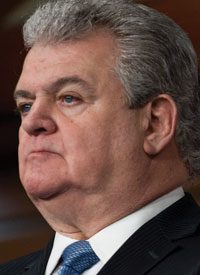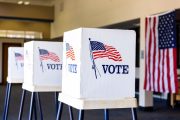
It took only a matter of hours after the Arizona shooting — amidst the leftist media war cry for government controls against animated political speech — for those calls to be translated into federal legislation. CNN reported January 9 that “Rep. Robert Brady, D-Pennsylvania, said he will introduce legislation making it a federal crime for a person to use language or symbols that could be perceived as threatening or inciting violence against a Member of Congress or federal official.”
“The president is a federal official,” Brady said in a telephone interview with CNN. “You can’t do it to him; you should not be able to do it to a congressman, senator or federal judge.” Of course, the key word is “perceived”; we’re not talking about an actual threat. Brady makes it pretty clear that he’s trying to squelch legitimate political dissent. “The rhetoric is just ramped up so negatively, so high, that we have got to shut this down,” Brady told CNN, adding a comment that tries to link political rhetoric with actual crimes: “I’ve had my share of death threats.”
Whatever emerges from the text of Brady’s legislation when it is publicly revealed, it certainly would not propose to make it a new crime to threaten a Congressman with violence. That’s been a federal offense — a crime called “assault” — for a long time. The existing U.S. Code Title 18, Section 351 reads in part:
Whoever assaults any person designated in subsection (a) [including Congressmen] of this section shall be fined under this title, or imprisoned not more than one year, or both; and if the assault involved the use of a dangerous weapon, or personal injury results, shall be fined under this title, or imprisoned not more than ten years, or both.
The Arizona shooting has already been the spark needed for the leftist media to clamor for criminalization of criticism of big government by deliberately commingling First Amendment-protected free speech with criminal threats of violence. Though protecting political rhetoric was the whole purpose of the First Amendment to the U.S. Constitution, Timothy Egan of the New York Times suggested on January 9, “Even if the gunman’s motives are never truly known, the splattering of so much innocent blood on a Saturday morning gives a nation as fractious as ours a chance to think about what happens when words are used as weapons, and weapons are used in place of words.”
Words Are “Weapons”?
In one sense this is true: Big-government candidates were massacred at the ballot box during the last congressional election in November, largely due to a vigorous debate over a variety of issues. And this election massacre was — and is — far more dangerous to big government than a lone lunatic with a handgun. This electoral “slaughter” is a metaphor for utilizing the freedom of speech, not a crime of real violence. It’s that kind of slaughter, not the Arizona shooting, against which new leftist legislation will be targeted.
“This country has a history of violence,” Chris Matthews began his January 10 MSNBC show Hardball, adding, “Gun violence against politicians is not a metaphor.” But MSNBC’s own pundits — including Matthews himself — frequently use violent metaphors all the time, such as “battle,” “war,” “shot,” and “crosshairs” — to describe the non-violent political proc-ess.
To paraphrase Sigmund Freud, sometimes a cigar is just a cigar, and sometimes a metaphor for violence is nothing more than a harmless metaphor. But if Matthews says people can’t use metaphors for violence, one can only wonder how he justifies using the following line in his new book The Hardball Handbook: “The battle over who should run the country was what I had thought about, talked about — and, yes, argued about — since I was in grade school.” Matthews confesses to being “hooked on politics since I was a kid, [finding] himself in the very crosshairs of American electoral warfare.”
Battle? Crosshairs of warfare? What’s Matthews trying to say? Is he trying to start a violent revolution? One would think so, based upon his own words and his claim that employing gun lexicon is never a metaphor. Yet Matthews criticizes former GOP vice presidential candidate Sarah Palin for using crosshairs as a graphic on her PAC’s website before the 2010 congressional elections.
One could criticize Matthews for being hypocritical, but his rhetoric — along with that of much of the Left — is consistent in that he is seeking to criminalize only criticism of big government. Paul Krugman of the New York Times made his view plain in arguing, “And it’s the saturation of our political discourse — and especially our airwaves — with eliminationist rhetoric that lies behind the rising tide of violence. Where’s that toxic rhetoric coming from? Let’s not make a false pretense of balance: it’s coming, overwhelmingly, from the right.”
Pima County Sheriff Clarence Dupnik supposedly set off the debate with a comment about how (despite no evidence for his conclusions) criticism of government officials must have been responsible for the shooting. “I think the vitriolic rhetoric that we hear day in and day out from people in the radio business and some people in the TV business and what (we) see on TV and how our youngsters are being raised, that this has not become the nice United States of America that most of us grew up in,” Dupnik told the press on January 8. The following day, Dupnik added: “To try to inflame the public on a daily basis 24 hours a day, seven days a week has impact on people, especially who are unbalanced personalities to begin with.”
That’s all it took for an “amen” chorus across the political Left. “The sheriff out there in Tucson, I think he’s got it right,” Rep. James Clyburn (D-S.C.), the Assistant Minority Whip, told Fox News Sunday. “Words do have consequences. And I think that we have to really — this is nothing new. I’ve been saying this for a long time now.”
“I think the sheriff was right,” House Minority Whip Rep. Steny Hoyer (D-Md.) agreed on CBS’ Face the Nation on January 9. Hoyer went on to commingle nonviolent political dissent with actual violence against officials, while (perhaps more significantly) lamenting to host Bob Schieffer the fact that the media is no longer politically policed by the big-three liberal television networks:
Bob, when — when you and I grew up, we grew up listening to a set of three major news outlets — NBC, ABC, and, of course, CBS. Most of the people like Walter Cronkite and Eric Sevareid, … and they saw their job as to inform us of the facts and we would make a conclusion. Far too many broadcasts now and so many outlets have the intent of inciting — of inciting people to opposition, to anger, to thinking the other side is less than moral. And I think that is a context in which somebody who is mentally unbalanced can somehow feel justified in taking this kind of action.
Hoyer is right that the big-three networks no longer control information. Their viewership has been shrinking for decades, replaced largely by the Internet. Thus, the popular new derogatory academic-Left buzzword for people who choose to seek out new information sites that give them accurate and relevant information from the Internet is “echo chamber.” The “echo chamber” has been the hobgoblin of the Left for several years; it has become the epitome of leftist fears that leftist media will no longer be able to compete in an open marketplace of ideas. The term “echo chamber” is supposed to be a reference to people who only get information from sources that reinforce their worldviews. Usually leftists imply that the “echo chamber’s” worldview is false. So it was no surprise that former President Clinton warned in a speech to the BBC after the tragedy, “We cannot be unaware of the fact that, particularly with the Internet, there’s this huge echo-chamber out there, and anything any of us says falls on the unhinged and the hinged alike, and we just have to be sensitive to it.”
Look for legislation on the Arizona shooting to be aimed at destroying people’s free choice of media and restoring the leftist “echo chamber” that existed back when Steny Hoyer was growing up. That echo chamber taught that it’s never appropriate to get angry at politics or politicians. The people do not have a right to be angry at politics, the old media oligopoly argued, even though their freedom is at stake during every election. The old school teaches that the real enemy is anger, and reactions like Howard Beale’s from the satirical film Network, who screamed, “I’m mad as hell and I’m not going to take it any more!” are a part of the problem and not a part of the solution.
Jack Shafer of Slate magazine offered one of the few reasonable analyses of the Arizona shooting: “Only the tiniest handful of people — most of whom are already behind bars, in psychiatric institutions, or on psycho-meds — can be driven to kill by political whispers or shouts. Asking us to forever hold our tongues lest we awake their deeper demons infantilizes and neuters us and makes politicians no safer.” Shafer’s column, “In Defense of Inflamed Rhetoric,” is a good example of how Americans are still free. And they will remain so if they can stop totalitarian legislation limiting metaphors in political speech from being enacted.
— Photo of Rep. Robert Brady (D-Pa.): AP Images



